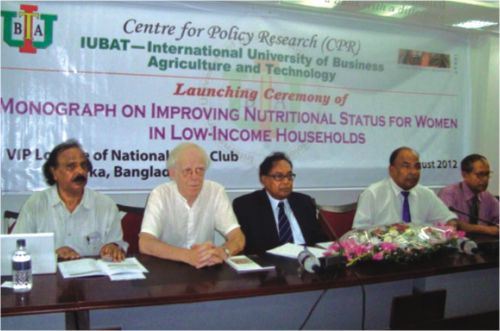News Snap
IUBAT Launches Research Monograph
The Launching Ceremony of the 8th monograph entitled “Improving Nutritional Status for Women in Low-Income Households” took place on August 30, 2012, at the VIP Lounge, National Press Club, Dhaka.
The monograph contains a detailed survey of the nutritional status of 600 women in low-income households of selected sites in urban and rural areas in the country. The urban survey took place in slums located in Uttara, in metropolitan Dhaka. The rural survey took place in four villages of Jamalpur district. The authors found that over one in five women are underweight and two in five probably have inadequate diets in terms of consumption of fruits, vegetables and dairy products. Such diets lead to deficiencies in vitamins and micro-nutrients (such as zinc, iron and calcium). The authors discussed several policies to improve nutrition among these women.
The monograph authors are Afifa Shahrin, former instructor in BRAC University and recent graduate of Simon Fraser University in Vancouver, Canada, and Professor Richards, also of Simon Fraser University. Professor Richards is a member of IUBAT's overseas advisory committee. They undertook the survey research in 2011 while working at IUBAT. The survey was conducted with the collaborative support of BRAC surveyors and students of IUBAT.

COURTESY: IUBAT
Professor Richards made a comprehensive presentation of the research monograph and discussed various factors that contribute to poor nutrition. Professor Dr M Alimullah Miyan, Vice-Chancellor, IUBAT, presided over the ceremony. Additional resource persons including senior academics from different universities, visitors from overseas collaborative universities, healthcare experts from the public and private sectors will be attending the function and taking part in the deliberations.
The monograph identified the importance of several factors that influence nutrition. Women's nutrition, in general, is better in rural households where access to fruits and vegetables is easier. It is better in households with higher education levels. Most women do not smoke, but their nutrition tends to be worse if other family members use tobacco. Some women reported lower food consumption due to higher food prices. These women typically suffered lower nutrition status.
| 